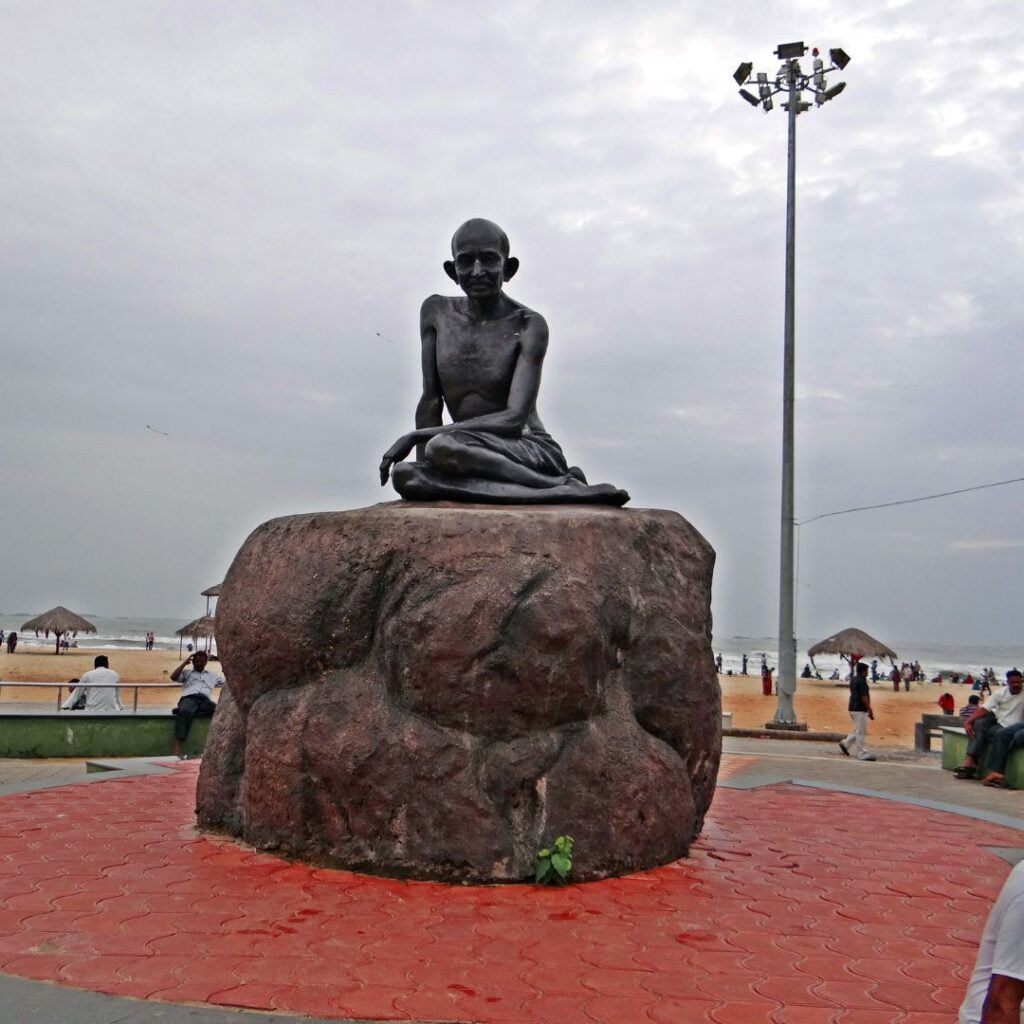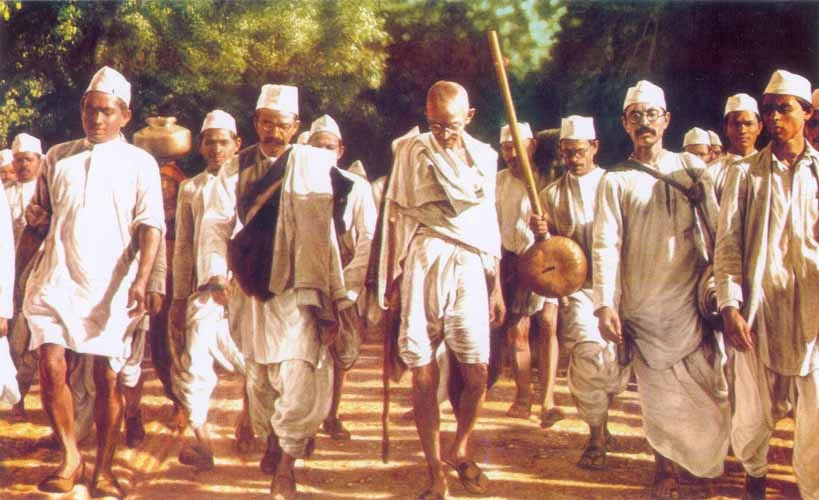On 2nd October Mahatma Gandhi Jayanti, celebrated every year, is a significant national holiday in India.
It is the birth anniversary of Mohandas Karamchand Gandhi, the man affectionately known as “Mahatma” or “Great Soul.”
Gandhi’s impact on India and the world at large is immeasurable, as his philosophy of non-violence, civil disobedience, and his tireless struggle for India’s independence have left an indelible mark on history. In this blog, we will delve into the life and principles of Mahatma Gandhi, the significance of Mahatma Gandhi Jayanti, and how it is celebrated today.
Mohandas Karamchand Gandhi: A Life of Peace and Nonviolence That Still Inspires Us in 2023
Why on 2nd October Mahatma Gandhi Jayanti Celebrate?
To honor his teachings and struggle against British rule, we commemorate Mahatma Gandhi’s birthday on this day. He was a well-known advocate of nonviolence among freedom fighters. Gandhi, Mohandas Karamchand, was born on October 2, 1869. People began referring to him as Mahatma Gandhi because he was honored with the title “Mahatma” by the people of India. This generation is still influenced by his teachings.

Mahatma Gandhi: A Glimpse into His Life
Born in Porbandar, Gujarat, on October 2, 1869, Mohandas Karamchand Gandhi grew up to become one of the most influential figures in modern history. He studied law in London and later practised in South Africa, where he became an advocate for civil rights and social justice. It was during his time in South Africa that Gandhi’s commitment to non-violence, or “Satyagraha,” began to take shape.
The Philosophy of Satyagraha
Gandhi’s philosophy of Satyagraha was rooted in the belief that truth and love could triumph over injustice and violence. He used non-violent resistance to lead campaigns for various social and political causes, including the rights of Indian immigrants in South Africa and India’s independence from British colonial rule. His famous salt march in 1930, where he led thousands on a 240-mile journey to the Arabian Sea to protest the British monopoly on salt production, is a testament to the power of non-violent protest.

Also read:
Quit India Movement: 75 Years of Non-Violent Protest and Freedom
The Significance of Mahatma Gandhi Jayanti
Mahatma Gandhi Jayanti is a day to reflect on Gandhi’s life and teachings and to honour his legacy. It is a time to remember his dedication to truth, non-violence, and his unwavering commitment to justice and equality. Gandhi’s principles continue to inspire individuals and movements worldwide who strive for social and political change through peaceful means.
The United Nations’ Recognition
In 2007, the United Nations General Assembly declared October 2nd as the International Day of Non-Violence, coinciding with Mahatma Gandhi Jayanti. This recognition underscores the universal appeal of Gandhi’s philosophy and its relevance in addressing global conflicts and promoting peace.
Celebrating Mahatma Gandhi Jayanti
Mahatma Gandhi Jayanti is celebrated across India and by people of Indian descent around the world. Here’s how the day is observed:
Morning Prayers and Offerings
The day typically begins with prayers and offerings at Gandhi’s memorial, Raj Ghat, in Delhi. People from all walks of life pay their respects by placing flowers and lighting candles at his memorial.
Community Service and Cleanliness Drives
One of the central themes of Mahatma Gandhi’s life was cleanliness and sanitation. In recent years, October 2nd has been associated with cleanliness drives and community service activities. Prime Minister Narendra Modi launched this year the ‘Ek Tareekh, Ek Ghanta, Ek Saath’ Campaign today on Oct 1st at 10 AM, a mega cleanliness drive, to mark the celebration of Gandhi Jayanti. This initiative encourages citizens to participate in cleanliness campaigns in their local communities, parks, and public places.
Educational Programs
Many schools and educational institutions in India organize special programs to educate students about Gandhi’s life and principles. These programs often include essay writing competitions, debates, and discussions about the relevance of Gandhi’s teachings in today’s world.
Cultural Events and Tributes
Cultural events, including plays, musical performances, and exhibitions, are organized to showcase Gandhi’s life and the freedom struggle. These events serve as a reminder of the sacrifices made by Gandhi and countless others in the fight for India’s independence.
Swachh Bharat Mission
Mahatma Gandhi’s emphasis on cleanliness and sanitation finds resonance in the Swachh Bharat Mission. Launched on October 2, 2014, the mission aims to make India open defecation-free and achieve universal sanitation coverage. This initiative aligns with Gandhi’s vision for a clean and healthy India.

Shramdaan for Swachhata 2023
To promote the mission’s objectives, Prime Minister Modi called for an hour of ‘Shramdaan for swachhata’ at 10 AM on the 1st of October, 2023. This call to action encourages citizens to actively participate in cleanliness drives in their neighbourhoods, streets, parks, and public places.
Swachhata Ambassadors
A unique aspect of the Swachh Bharat Mission is the appointment of Swachhata Ambassadors, individuals who actively promote cleanliness and sanitation in their communities. These ambassadors play a vital role in spreading awareness and motivating others to join the cleanliness movement.
Conclusion
Mahatma Gandhi Jayanti is not just a national holiday; it is a day to honour the enduring legacy of a man whose life was dedicated to the principles of truth, non-violence, and social justice. Gandhi’s teachings continue to inspire individuals and movements around the world, reminding us that even in the face of adversity, positive change can be achieved through peaceful means.
As we celebrate Mahatma Gandhi Jayanti, let us reflect on his timeless message and strive to uphold the values he held dear – values that have the power to transform societies and promote a more just and peaceful world.
Gandhi Jayanti and Swachh Bharat Mission: A Call to Cleanliness
FAQs
Q1: Why is Mahatma Gandhi Jayanti on October 2nd so significant?
A: It’s significant because it’s the day we celebrate the life and teachings of a man who dedicated his life to peace and justice, Mahatma Gandhi.
Q2: How can we pay tribute to Mahatma Gandhi on this special day?
A: We can pay tribute by reflecting on his principles of non-violence, truth, and service, and by engaging in acts of kindness and social service.
Q: Why is Gandhi’s message of non-violence still relevant today?
A: His message is relevant because it reminds us of the power of peaceful resistance and compassion in a world often filled with conflict.
Q4: What are some key lessons we can learn from Mahatma Gandhi’s life and struggle?
A: Lessons of perseverance, truth, selflessness, and the impact of non-violence in bringing about positive change.
Q5: How can we promote Gandhian values in our daily lives?
A: By practicing non-violence, truthfulness, humility, simplicity, and sustainability in our daily actions and decisions.
Q6: How do people in India and around the world commemorate Mahatma Gandhi Jayanti?
A: Through prayer meetings, seminars, cultural events, rallies, and community service activities that honor Gandhi’s memory.
Q7: Why do people offer floral tributes at Gandhi’s statues on this day?
A: Offering flowers symbolizes respect for his purity of purpose and dedication to simplicity, values he cherished.
Q8: What role did Mahatma Gandhi play in India’s fight for independence?
A: He played a central role by leading non-violent movements, inspiring millions to join the struggle for India’s independence.
Q9: How can we ensure that the legacy of Mahatma Gandhi continues to inspire future generations?
A: By educating the youth about his life and principles, encouraging them to practice non-violence, empathy, and truth.
Q10: In one word, what does Mahatma Gandhi Jayanti mean to you emotionally?
A: Inspiration. It emotionally inspires us to strive for a world filled with peace, justice, and love, just as he did.
